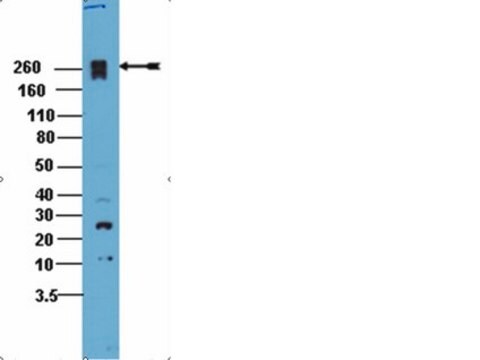3018
Transcreener® UDP2 FP Assay
Sinónimos:
Transcreener assay
Iniciar sesiónpara Ver la Fijación de precios por contrato y de la organización
About This Item
UNSPSC Code:
41122100
NACRES:
NA.84
Productos recomendados
shipped in
dry ice
storage temp.
−20°C
General description
The Transcreener® UDP2 FP Assay is a universal biochemical HTS assay for enzymes that produce UDP, including glycosyltransferase, galactosyltransferase, glucuronyltransferase, N-acetylglucosamyltransferase, N-acetlygalactosyltransferase, xylosyltransferase, and glycogen, cellulose, lactose and hyaluronan synthases. Enzyme activity is signaled by a decrease in fluorescence polarization as the bound tracer is displaced from the Transcreener® UDP2 Antibody. The assay is a simple single step mix-and-read format enabling the use of unmodified native substrate concentrations of 1 – 1000 μM. The assay provides excellent signal at low substrate conversion, with a Z′ =0.7 and =100 millipolarization shift (mP) under normal reaction conditions.
View full Transcreener® product list
View full Transcreener® product list
Quantity
3018-1K = 1,000 assay, 384-well
3018-10K = 10,000 assay, 384-well
3018-10K = 10,000 assay, 384-well
Physical form
Kit with buffered aqueous solutions
Legal Information
Transcreener is a registered trademark of BellBrook Labs
Certificados de análisis (COA)
Busque Certificados de análisis (COA) introduciendo el número de lote del producto. Los números de lote se encuentran en la etiqueta del producto después de las palabras «Lot» o «Batch»
¿Ya tiene este producto?
Encuentre la documentación para los productos que ha comprado recientemente en la Biblioteca de documentos.
Traci E Battle et al.
Blood, 102(8), 3016-3024 (2003-07-12)
Bryostatin 1 is known to exhibit in vitro and in vivo activity against chronic lymphocytic leukemia (CLL) cells by inducing their further maturation into plasma-like cells. Signal transducer and activator of transcription (STAT) proteins play a central role in B-lymphocyte
Dennis S Metselaar et al.
EBioMedicine, 50, 81-92 (2019-11-19)
Pediatric high-grade gliomas (pHGG) are the leading cause of cancer-related death during childhood. Due to their diffuse growth characteristics, chemoresistance and location behind the blood-brain barrier (BBB), the prognosis of pHGG has barely improved in the past decades. As such
Nuestro equipo de científicos tiene experiencia en todas las áreas de investigación: Ciencias de la vida, Ciencia de los materiales, Síntesis química, Cromatografía, Analítica y muchas otras.
Póngase en contacto con el Servicio técnico








